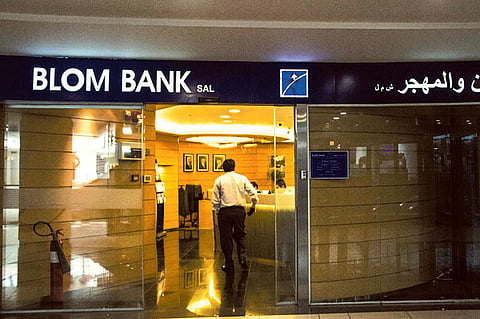Moody’s declares ‘deposit default’ for three top Lebanese banks
Bank Audi, Blom Bank and Byblos Bank had their baseline credit assessments downgraded

Beirut: Moody’s Investors Service said emergency measures by Lebanon’s central bank to address foreign-currency shortages forced three of the country’s top lenders into a “deposit default”.
Bank Audi, Blom Bank and Byblos Bank also had their baseline credit assessments, or BCAs, downgraded to the second lowest level in what Moody’s said wasn’t a credit rating action. It describes BCAs as an opinion on “issuers’ stand-alone intrinsic strength,” absent any extraordinary support from outside.
“The downgrade is driven by the payment of part of the interest for foreign currency deposits in local currency by banks in Lebanon following instructions by the country’s central bank, which constitutes a deposit default based on the rating agency’s own definitions,” the company said in a statement.
Staring down the worst financial crisis the country has faced in decades, the central bank last week told lenders to pay half of foreign-currency deposits in Lebanese pounds. It plans to do the same on what it owes banks for dollar-denominated deposits and certificates of deposits.
While Moody’s didn’t change any other assessments for the three banks, it said they remain on review for downgrade. Last month, it lowered their long-term issuer credit ratings by two notches to the fifth-lowest junk level, warning that Lebanon’s economic crisis is draining liquidity from the system.
It’s also expressed alarm at the banks’ high exposure to government debt held on their balance sheets and the deteriorating operating environment.
Political upheaval, coupled with a reversal in deposit inflows, are threatening the government’s funding model, which relied heavily on remittances from the millions of Lebanese living abroad.
Private-sector deposits at banks declined by $4.3 billion, or 2.5 per cent, in the first nine months of this year. The share of dollar accounts rose to 73 per cent as confidence in the decades-old currency peg declines.
Sign up for the Daily Briefing
Get the latest news and updates straight to your inbox



